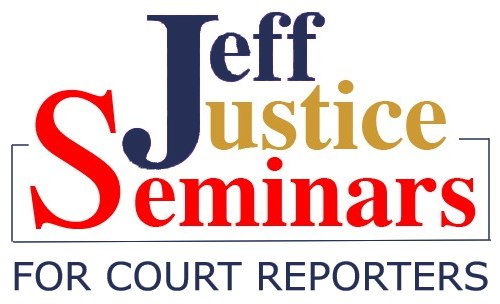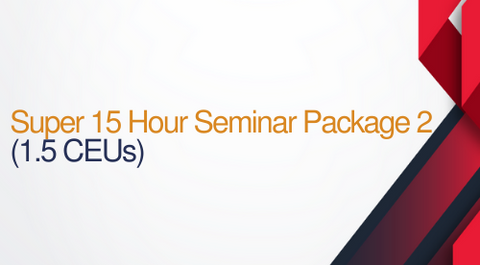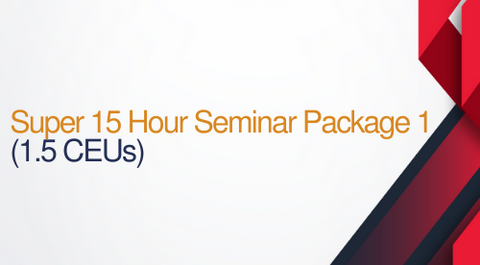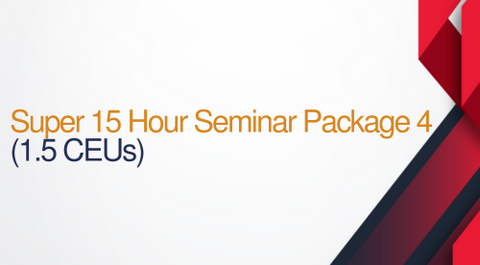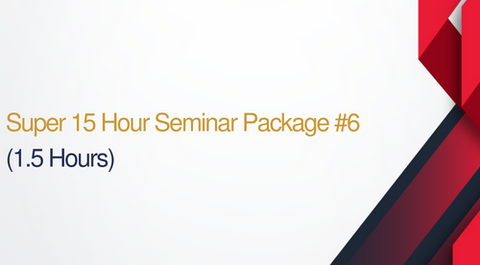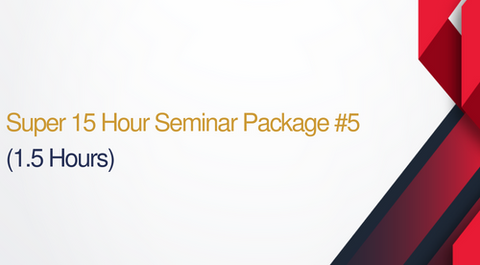Super 15 Hour Seminar Package #3 - 15 Hours (1.5 CEUs)
Session 1 Title English and Grammar Skills for Court Reporters – Part 1 2hrs (120 Min) Presenter: Anita Paul Johnson, CSR-CCR-CRR-CRI-CPE-CCP-CBC-CSP In this 2-hour interactive, fun presentation, we cover the latest grammar, proofreading,...
Session 1
Title English and Grammar Skills for Court Reporters – Part 1 2hrs (120 Min)
Presenter: Anita Paul Johnson, CSR-CCR-CRR-CRI-CPE-CCP-CBC-CSP
In this 2-hour interactive, fun presentation, we cover the latest grammar, proofreading, and capitalization rules, especially geared to transcript preparation.
Learning Objectives:
To review and perfect rules of capitalization, basic grammar, and proofreading techniques to create total accuracy. Through quizzes and interactive exercises, court reporters will boost their retention and mastery of these essential skills for transcript preparation.
Specific Topics:
•When to capitalize words and when not to
•Basic essential grammar
•Proofreading techniques to improve accuracy
Learning Outcomes
Court reporters will learn easy techniques to clarify capitalization rules during excellent transcript preparation; master vital grammar rules and applications for instant recall; how to proofread most effectively and accurately.
Session 2
Title: English and Grammar Skills for Court Reporters – Part 2 2hrs (120 Min)
Presenter: Anita Paul Johnson, CSR-CCR-CRR-CRI-CPE-CCP-CBC-CSP
In this 2-hour seminar we focus on punctuation, “word pairs,” hyphens, and how to use quotes. Participants will enjoy memorable, useful training with unforgettable results.
Learning Objectives:
To review and perfect rules of punctuation, “word pairs” – which word is correct, hyphens, and how to use quotes in transcripts. Learning takes place by court reporters working with a partner, working in small groups, and participating in fun tests.
Specific Topics:
•Mastering punctuation – where it goes and when not to punctuate
•Review of “word pairs” and how to select the correct word (e.g. altogether, all together)
•When to hyphenate and when not to
•Proper quotes punctuation and single quotes in transcripts
Learning Outcomes
Court reporters will sharpen their skills to punctuate transcripts properly, spell homophones correctly and select proper spellings when two words are close, they will learn the general rules and guidelines on when to hyphenate words, and how to apply proper quote concepts in transcripts.
Session 3
Title: English and Grammar Skills for Court Reporters – Part 3 2hrs (120 Min)
Presenter: Anita Paul Johnson, CSR-CCR-CRR-CRI-CPE-CCP-CBC-CSP
In this 2-hour interactive, fun presentation, we perfect the 50 most common spelling errors, number – words or digits, and parentheticals,
Learning Objectives:
To master spellings of tricky words and clean up most common mistakes, to format numbers – words or digits correctly, and review the most appropriate parentheticals for excellent transcript preparation. By using games, quizzes, presentations, and interactive exercises, we bring learning and retention to a high success level and enjoy a competitive spirit
Specific Topics:
•Spelling – the 50 most common spelling errors
•Formatting numbers properly
•Correct application of parentheticals
Learning Outcomes
Court reporters will learn to master the 50 most common spelling errors, format and display numbers correctly, and when to use parentheticals for clear reading, without cluttering a transcript.
Session 4
Title: “Turn The Lights On- Ethics”
Ethics for Court Reporters: 2.5 hours
Presenter: Pam Coder, CSR
This program covers how to handle various situations that arise, such as:
- When and when not to interrupt proceedings
- The videographer did what? Said what?
- Confidential transcripts or portions thereof
- Pro se party wants you to do what?
- Accents, dialects, dilemmas
- The reporter was asked to do what?
- Timely delivery
Session 5
Title: Personal Power 2hrs (120 Min)
Presenter: Anita Paul Johnson, CSR-CCR-CRR-CRI-CPE-CCP-CBC-CSP
In this 2-hour seminar, Anita shows how to work at your peak and maintain emotional control over your life.
Learning Objectives:
To review and perfect rules of punctuation, “word pairs” – which word is correct, hyphens, and how to use quotes in transcripts. Learning takes place by court reporters working with a partner, working in small groups, and participating in fun tests.
Specific Topics:
- Identifying the power of energy and emotions, including High positive energy, Low positive energy, Low negative energy, High negative energy, and the role each plays in mastering emotions
- Techniques for Visualizations to minimize fear in different situations
Learning Outcomes
Court reporters will learn proven successful techniques applied by Olympic champions, CEOs, and other highly successful people in stress situations. These techniques will follow in all aspects of their life by creating excellent peak performance when it counts. They will learn emotional control when it is vital.
Session 6
Session Title: “Sound Bites”
Presenter: Pam Coder, CSR
Learning Outcomes:
Learning objectives include different ways of receiving audio in depositions, court, hearings or arbitrations from small rooms to large rooms. Different types of sound equipment, cost, where to find it, how to use it.
Content Outline:
This session will introduce various equipment to aid in hearing soft-spoken witnesses, soft-spoken judges, and hard-to-hear testimony.
The participants will discover:
- How to quickly adjust for various settings
- How to adjust audio settings for a better experience
- Using different types of equipment for the best hearing experience
Appropriate Methodology:
The session is interactive and combines hands-on instruction with a PowerPoint presentation. Participants will discuss what works for them in their surroundings and what might work for others in the same or similar circumstances.
Session 7
Title: Ethics By Choice Or By Chance 2.5 hours (150 Min)
Presenter: Pam Gwin Coder
Course Objective:
Working with reporters to identify tricky ethical situations in various settings we encounter every day in the workplace and how to effectively handle said situations immediately, effectively, professionally, humorously, and ethically for the benefit of the reporter as well as the clients.
Special format: Group participation and discussion.
Specific topics:
Pam discusses changes in the Ethics rules for NCRA as well as some other states like Texas and Arizona. She also takes the class through what to do ethically in certain situations dealing with attorneys and clients.
